安顺学院:《实用口译》精品课程教学资源(PPT课件讲稿)Chapter 7 主动与被动

Chapter 7 主动与被动 1
1 Chapter 7 主动与被动
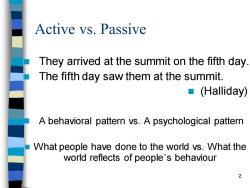
Active vs.Passive They arrived at the summit on the fifth day The fifth day saw them at the summit. (Halliday) A behavioral pattern vs.A psychological pattern What people have done to the world vs.What the world reflects of people's behaviour 2
2 Active vs. Passive ◼ They arrived at the summit on the fifth day. ◼ The fifth day saw them at the summit. ◼ (Halliday) ◼ A behavioral pattern vs. A psychological pattern ◼ What people have done to the world vs. What the world reflects of people’s behaviour
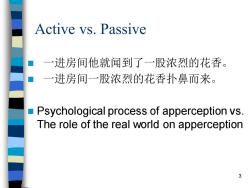
Active vs.Passive 一进房间他就闻到了一股浓烈的花香 一进房间一股浓烈的花香扑鼻而来。 a Psychological process of apperception vs The role of the real world on apperception 3
3 Active vs. Passive ◼ 一进房间他就闻到了一股浓烈的花香。 ◼ 一进房间一股浓烈的花香扑鼻而来。 ◼ Psychological process of apperception vs. The role of the real world on apperception
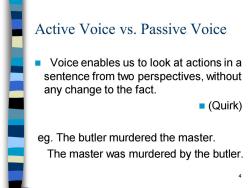
Active Voice vs.Passive Voice Voice enables us to look at actions in a sentence from two perspectives,without any change to the fact. ■(Quirk) eg.The butler murdered the master. The master was murdered by the butler. 4
4 Active Voice vs. Passive Voice ◼ Voice enables us to look at actions in a sentence from two perspectives, without any change to the fact. ◼ (Quirk) eg. The butler murdered the master. The master was murdered by the butler
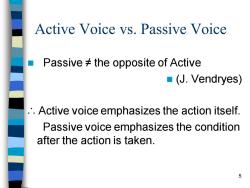
Active Voice vs.Passive Voice Passive the opposite of Active ■(J.Vendryes) .Active voice emphasizes the action itself. Passive voice emphasizes the condition after the action is taken. 5
5 Active Voice vs. Passive Voice ◼ Passive ≠ the opposite of Active ◼ (J. Vendryes) ∴ Active voice emphasizes the action itself. Passive voice emphasizes the condition after the action is taken
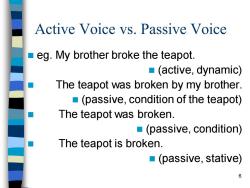
Active Voice vs.Passive Voice eg.My brother broke the teapot. ■(active,dynamic) The teapot was broken by my brother. (passive,condition of the teapot) The teapot was broken. (passive,condition) The teapot is broken. ■(passive,stative) 6
6 Active Voice vs. Passive Voice ◼ eg. My brother broke the teapot. ◼ (active, dynamic) ◼ The teapot was broken by my brother. ◼ (passive, condition of the teapot) ◼ The teapot was broken. ◼ (passive, condition) ◼ The teapot is broken. ◼ (passive, stative)
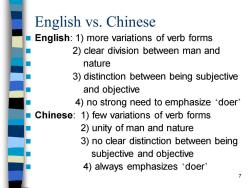
English vs.Chinese English:1)more variations of verb forms 2)clear division between man and nature 3)distinction between being subjective and objective 4)no strong need to emphasize 'doer Chinese:1)few variations of verb forms 2)unity of man and nature 3)no clear distinction between being subjective and objective 4)always emphasizes doer' 7
7 English vs. Chinese ◼ English: 1) more variations of verb forms ◼ 2) clear division between man and ◼ nature ◼ 3) distinction between being subjective ◼ and objective ◼ 4) no strong need to emphasize ‘doer’ ◼ Chinese: 1) few variations of verb forms ◼ 2) unity of man and nature ◼ 3) no clear distinction between being ◼ subjective and objective ◼ 4) always emphasizes ‘doer’
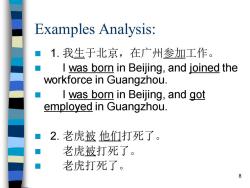
Examples Analysis: ■ 1.我生于北京,在广州参加工作。 I was born in Beijing,and joined the workforce in Guangzhou. I was born in Beijing,and got employed in Guangzhou. 2.老虎被他们打死了。 老虎被打死了。 老虎打死了。 8
8 Examples Analysis: ◼ 1. 我生于北京,在广州参加工作。 ◼ I was born in Beijing, and joined the workforce in Guangzhou. ◼ I was born in Beijing, and got employed in Guangzhou. ◼ 2. 老虎被 他们打死了。 ◼ 老虎被打死了。 ◼ 老虎打死了
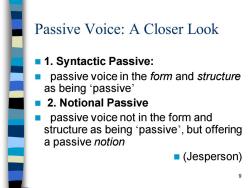
Passive Voice:A Closer Look 1.Syntactic Passive: passive voice in the form and structure as being 'passive ■2.Notional Passive passive voice not in the form and structure as being passive',but offering a passive notion ■(Jesperson) 9
9 Passive Voice: A Closer Look ◼ 1. Syntactic Passive: ◼ passive voice in the form and structure as being ‘passive’ ◼ 2. Notional Passive ◼ passive voice not in the form and structure as being ‘passive’, but offering a passive notion ◼ (Jesperson)
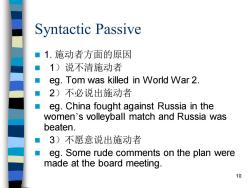
Syntactic Passive ■1.施动者方面的原因 1)说不清施动者 eg.Tom was killed in World War 2 2)不必说出施动者 eg.China fought against Russia in the women's volleyball match and Russia was beaten. 3)不愿意说出施动者 eg.Some rude comments on the plan were made at the board meeting. 10
10 Syntactic Passive ◼ 1. 施动者方面的原因 ◼ 1)说不清施动者 ◼ eg. Tom was killed in World War 2. ◼ 2)不必说出施动者 ◼ eg. China fought against Russia in the women’s volleyball match and Russia was beaten. ◼ 3)不愿意说出施动者 ◼ eg. Some rude comments on the plan were made at the board meeting
按次数下载不扣除下载券;
注册用户24小时内重复下载只扣除一次;
顺序:VIP每日次数-->可用次数-->下载券;
- 安顺学院:《实用口译》精品课程教学资源(PPT课件讲稿)Chapter 6 动态与静态.ppt
- 安顺学院:《实用口译》精品课程教学资源(PPT课件讲稿)Chapter 5 句子结构.ppt
- 安顺学院:《实用口译》精品课程教学资源(PPT课件讲稿)Chapter 4 形合与意合.ppt
- 安顺学院:《实用口译》精品课程教学资源(PPT课件讲稿)Chapter 3 汉英谓语对比.ppt
- 安顺学院:《实用口译》精品课程教学资源(PPT课件讲稿)Chapter 2 主题与主语.ppt
- 安顺学院:《实用口译》精品课程教学资源(PPT课件讲稿)Chapter 1 语音与文字.ppt
- 安顺学院:《英语语言学基础 Foundation of English Linguistics》课程教学资源(PPT课件讲稿)Chapter 6 Pragmatics & Discourse Analysis 6.2 Cooperative Principle 3.ppt
- 安顺学院:《英语语言学基础 Foundation of English Linguistics》课程教学资源(PPT课件讲稿)Chapter 4 Syntax.ppt
- 安顺学院:《英语语言学基础 Foundation of English Linguistics》课程教学资源(PPT课件讲稿)chapter 3 Morphology.ppt
- 安顺学院:《英语语言学基础 Foundation of English Linguistics》课程教学资源(PPT课件讲稿)chapter 2 Phonetics and Phonology.ppt
- 安顺学院:《英语语言学基础 Foundation of English Linguistics》课程教学资源(PPT课件讲稿)chapter 1 Language and linguistics(王慧颖).ppt
- 安顺学院:《英语语言学》课程教学资源(学生成果展示PPT)Error Analysis 错误分析.ppt
- 安顺学院:《英语语言学》课程教学资源(学生成果展示PPT)Linguistics and language teaching.ppt
- 安顺学院:《英语语言学》课程教学资源(学生成果展示PPT)Second Language.ppt
- 安顺学院:《英语语言学》课程教学资源(学生成果展示PPT)Culture & Language.ppt
- 安顺学院:《英语语言学》课程教学资源(学生成果展示PPT)Linguistic evidence of cultural differences.ppt
- 安顺学院:《英语语言学》课程教学资源(学生成果展示PPT)Dialect varieties、Register、Language and Culture.ppt
- 安顺学院:《英语语言学》课程教学资源(学生成果展示PPT)Language and social culture.ppt
- 对外经济贸易大学:《阿拉伯语经贸谈判与口译 Arabic Business Negotiation》课程教学资源(授课教案)第十六讲 劳务输出与承包工程项目谈判 التفاوض في مشروع المقاولات وتصدير العمالة.pdf
- 对外经济贸易大学:《阿拉伯语经贸谈判与口译 Arabic Business Negotiation》课程教学资源(授课教案)第十五讲 外国投资项目谈判 التفاوض في مشروع الاستثمار.pdf
- 安顺学院:《实用口译》精品课程教学资源(PPT课件讲稿)Chapter 8 语篇衔接.ppt
- 对外经济贸易大学:《意大利语经贸谈判与口译 International Business Negotiations in Lingua Italiana》课程教学资源(教学大纲,周莉莉).pdf
- 对外经济贸易大学:《意大利语经贸谈判与口译 International Business Negotiations in Lingua Italiana》课程教学资源(授课教案)第一课 Richiesta di Informazioni(周莉莉).pdf
- 对外经济贸易大学:《意大利语经贸谈判与口译 International Business Negotiations in Lingua Italiana》课程教学资源(授课教案)第三课 Termini di Pagamento.pdf
- 对外经济贸易大学:《意大利语经贸谈判与口译 International Business Negotiations in Lingua Italiana》课程教学资源(授课教案)第五课 Assicurazione.pdf
- 对外经济贸易大学:《意大利语经贸谈判与口译 International Business Negotiations in Lingua Italiana》课程教学资源(授课教案)第四课 Imballare ed Etichettare.pdf
- 对外经济贸易大学:《意大利语经贸谈判与口译 International Business Negotiations in Lingua Italiana》课程教学资源(授课教案)第七课 La Consegna.pdf
- 对外经济贸易大学:《意大利语经贸谈判与口译 International Business Negotiations in Lingua Italiana》课程教学资源(授课教案)第九课 Consulenza.pdf
- 对外经济贸易大学:《意大利语经贸谈判与口译 International Business Negotiations in Lingua Italiana》课程教学资源(授课教案)第八课 Riclami e Accomodamenti o Liquidazioni.pdf
- 对外经济贸易大学:《意大利语经贸谈判与口译 International Business Negotiations in Lingua Italiana》课程教学资源(授课教案)第六课 Imbarco–Spedizione - Carico.pdf
- 对外经济贸易大学:《意大利语经贸谈判与口译 International Business Negotiations in Lingua Italiana》课程教学资源(授课教案)第十课 Agenzia.pdf
- 对外经济贸易大学:《意大利语经贸谈判与口译 International Business Negotiations in Lingua Italiana》课程教学资源(授课教案)第十一课 Credito Internazionale.pdf
- 对外经济贸易大学:《意大利语经贸谈判与口译 International Business Negotiations in Lingua Italiana》课程教学资源(授课教案)第十三课 Le Societa' Miste.pdf
- 对外经济贸易大学:《意大利语经贸谈判与口译 International Business Negotiations in Lingua Italiana》课程教学资源(授课教案)第十二课 Un Progetto Consegna Chiavi in Mano.pdf
- 对外经济贸易大学:《意大利语经贸谈判与口译 International Business Negotiations in Lingua Italiana》课程教学资源(授课教案)第十五课 Appuntamenti e Colazioni di Lavoro.pdf
- 对外经济贸易大学:《意大利语经贸谈判与口译 International Business Negotiations in Lingua Italiana》课程教学资源(授课教案)第十四课 Tenders e Trasferimento di Tecnologia.pdf
- 对外经济贸易大学:《高级商务英语听说》课程教学资源(课程建设报告).pdf
- 对外经济贸易大学:《高级商务英语听说》课程教学资源(教学大纲).pdf
- 对外经济贸易大学:《高级商务英语听说》课程教学资源(试卷习题)期末考试试卷(A卷).pdf
- 对外经济贸易大学:《高级商务英语听说》课程教学资源(试卷习题)期末考试试卷(A卷)答案.pdf
